The Political Thought
of Justice Antonin Scalia
The Political Thought
of Justice Antonin Scalia
A Hamiltonian
on the Supreme Court
James B. Staab

ROWMAN & LITTLEFIELD PUBLISHERS, INC.
Published in the United States of America
by Rowman & Littlefield Publishers, Inc.
A wholly owned subsidiary of The Rowman & Littlefield Publishing Group, Inc.
4501 Forbes Boulevard, Suite 200, Lanham, Maryland 20706
www.rowmanlittlefield.com
PO Box 317
Oxford
OX2 9RU, UK
Copyright 2006 by Rowman & Littlefield Publishers, Inc.
All rights reserved. No part of this publication may be reproduced, stored in a retrieval system, or transmitted in any form or by any means, electronic, mechanical, photocopying, recording, or otherwise, without the prior permission of the publisher.
British Library Cataloguing in Publication Information Available
Library of Congress Cataloging-in-Publication Data
Staab, James Brian.
The political thought of Justice Antonin Scalia : a Hamiltonian on the Supreme Court / James B. Staab.
p. cm.
Includes bibliographical references and index.
ISBN-13: 978-0-7425-4311-9 (pbk. : alk. paper)
1. Scalia, AntoninPolitical and social views. 2. United States. Supreme CourtBiography. 3. Constitutional lawUnited States. 4. Constitutional historyUnited States. I. Title.
KF8745.S33S73 2005
342.73dc22 2005030662
Printed in the United States of America
 The paper used in this publication meets the minimum requirements of American National Standard for Information SciencesPermanence of Paper for Printed Library Materials, ANSI/NISO Z39.48-1992.
The paper used in this publication meets the minimum requirements of American National Standard for Information SciencesPermanence of Paper for Printed Library Materials, ANSI/NISO Z39.48-1992.
To Rene
Contents
Acknowledgments
I am grateful to have the opportunity to thank and acknowledge the many people who helped me with this book project. Henry J. Abraham and David M. OBrien, my two graduate advisers at the University of Virginia, provided invaluable support and assistance during all stages of this project. Several other colleagues provided helpful comments on particular aspects of the book, including Martha Derthick, James V. Young, James W. Ceaser, A. E. Dick Howard, Miles Williams, and Paul McCartney. I wish to extend a special thanks to John Dinan and Don Wallace, each of whom read the entire manuscript and provided sage advice on how to improve it. The library staff at Central Missouri State University acquired the countless articles and books that allowed me to conduct the research for the manuscript. I would like to thank, in particular, Vanessa Chappell, Patti Morrison, Lori Fitterling, Marian Davis, Teresa Heater, Jim Agee, Scott Norwood, and Mark Love. I am indebted to Kirk Randazzo for his able and patient assistance in conducting research on Harold Spaeths Supreme Court databases. For the chapters discussing Justice Scalias views on federalism, The Journal of Law & Politics and Roger Williams University Law Review kindly allowed me to reprint portions of articles I had previously published with them. Christopher Anzalone, my editor at Rowman & Littlefield, was a superb collaborator on this project who believed in the books thesis from the beginning and made many excellent and necessary editorial suggestions. Karen Ackermann and Molly Ahearn, production editors at Rowman & Littlefield, also provided valuable editorial assistance. Finally, I would like to thank my wife, Rene, for her patience and encouragement during the time I was working on this project, as well as for her helpful suggestions on how to improve the substance and style of the book. It is to her that this book is dedicated.
Abbreviations
BORBernard Schwartz, ed., The Bill of Rights: A Documentary History, 2 vols. (New York: Chelsea House Publishers, 1971).
CAHerbert J. Storing, ed., The Complete Anti-Federalist, 7 vols. (Chicago: University of Chicago Press, 1981).
CommentariesJoseph Story, Commentaries on the Constitution of the United States, 2 vols, 5th ed. (Boston: Hilliard, Gray, and Company, 1905).
DebatesJohn Elliot, ed., The Debates in the Several State Conventions on the Adoption of the Federal Constitution, 5 vols. (Salem, NH: Ayer Co. Publishers, 1987).
FPIsaac Kramnick, ed., The Federalist Papers (New York: Penguin Books, 1987).
HABPHarry A. Blackmun Papers (Washington, DC: Library of Congress, Manuscript Division, 2003).
L&OWJMLetters and Other Writings of James Madison, 4 vols. (Philadelphia: J. B. Lippincott & Co., 1865).
LPAHJulius Goebel Jr., ed., The Law Practice of Alexander Hamilton: Documents and Commentary, 5 vols. (New York: Columbia University Press, 1964).
PAHHarold C. Syrett et al., ed., The Papers of Alexander Hamilton, 27 vols. (New York: Columbia University Press, 19611987).
PJMWilliam T. Hutchinson et al., ed., The Papers of James Madison, 17 vols. (Chicago and Charlottesville: University of Chicago Press and University of Virginia Press, 19621991).
RecordsMax Farrand, ed., The Records of the Federal Convention of 1787, 3 vols. (New Haven, CT: Yale University Press, 1966).
SWEBSelect Works of Edmund Burke, 3 vols., new imprint of the Payne Edition (Indianapolis, IN: Liberty Fund, 1999).
WJMGaillard Hunt, ed., The Writings of James Madison, 9 vols. (New York: G. P. Putnams Sons, 19001910).
WTJAlbert Ellery Bergh, ed., The Writings of Thomas Jefferson, 20 vols. (Washington, DC: Thomas Jefferson Memorial Association, 19031904).

Investiture ceremony of Chief Justice William Rehnquist and Justice Antonin Scalia at the Front Plaza. The retiring Chief Justice Warren Burger is in the center.
Photographer: Joel Richardson
Courtesy of the Supreme Court of the United States
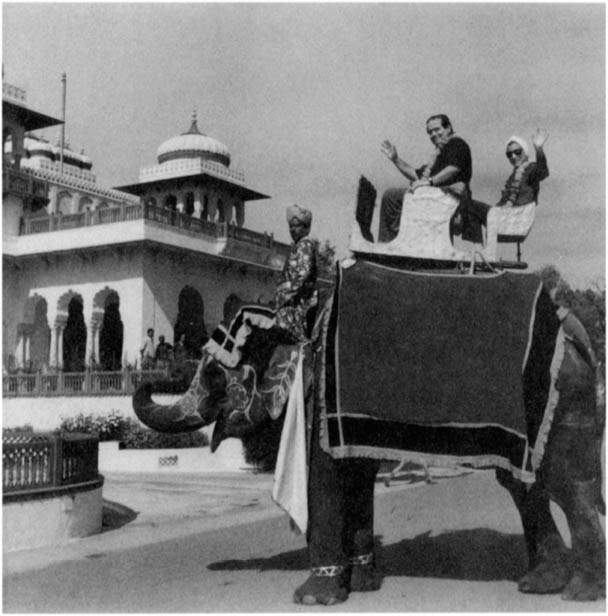
Justices Antonin Scalia and Ruth Bader Ginsburg on an elephant in India
Courtesy of the Supreme Court of the United States
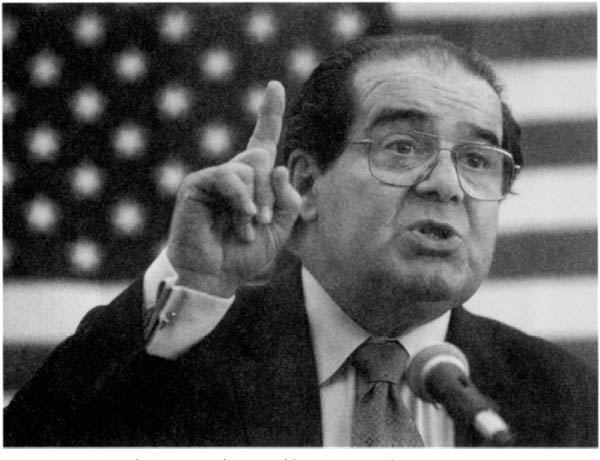
Justice Antonin Scalia at an April 2004 address in Hattiesburg, Mississippi
Courtesy of the Hattiesburg American
Introduction: Scalias Distinctive Brand of Conservatism
To his enthusiasts, Antonin Scalia is probably the greatest judge to sit on the United States Supreme Court since Chief Justice John Marshall. To his detractors, he is a conservative activist bent on turning back the progress made during the Warren and Burger courts. But on one thing both sides can agree: Justice Scalia is one of the most provocative and controversial public officials in modern times. Since his appointment to the Supreme Court in 1986, a cottage industry of scholarship has been produced on Scalia. Whether it be his sharp and witty sense of humor, his take-no-prisoners approach to deciding cases, or his keen and wide-ranging intellect, Court watchers seem to draw near when he speaks on or off the bench. But what has not been examined very closely is Scalias political philosophy. True, Scalia is usually referred to as a conservative, but the nature of
Next page

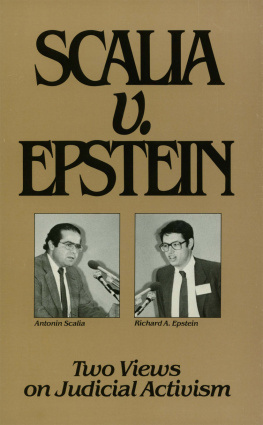
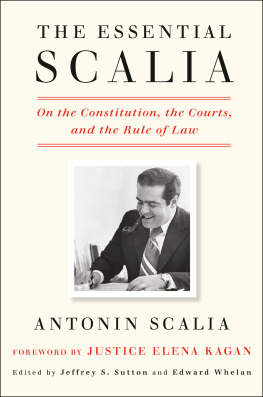
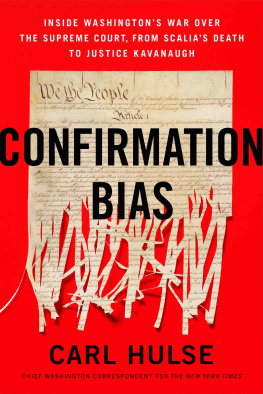
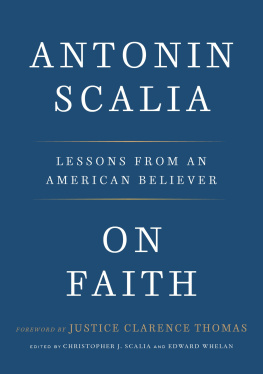
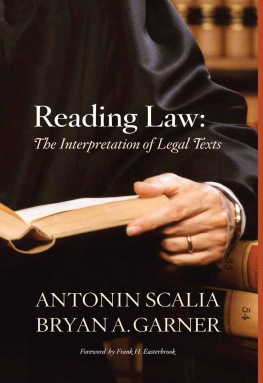
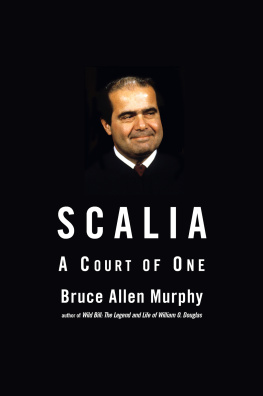

 The paper used in this publication meets the minimum requirements of American National Standard for Information SciencesPermanence of Paper for Printed Library Materials, ANSI/NISO Z39.48-1992.
The paper used in this publication meets the minimum requirements of American National Standard for Information SciencesPermanence of Paper for Printed Library Materials, ANSI/NISO Z39.48-1992.

